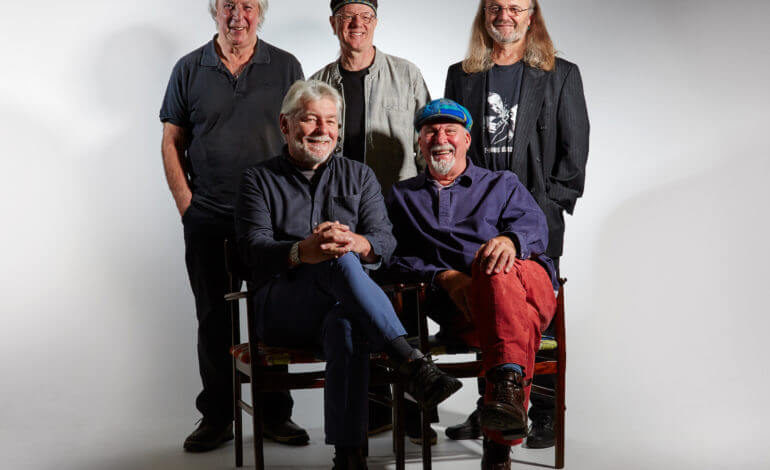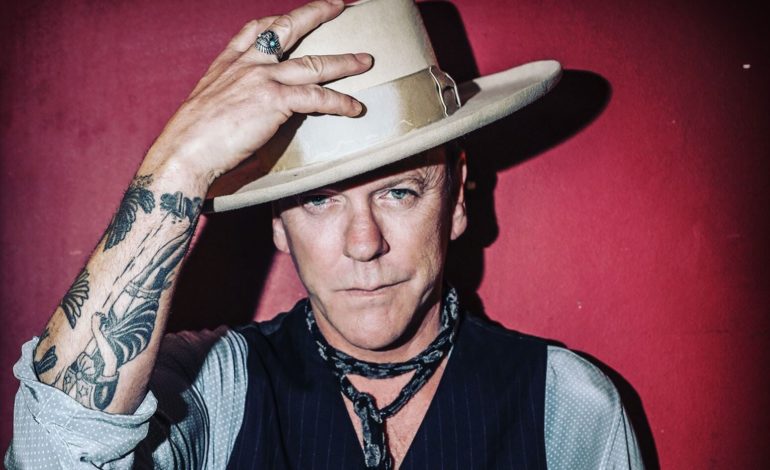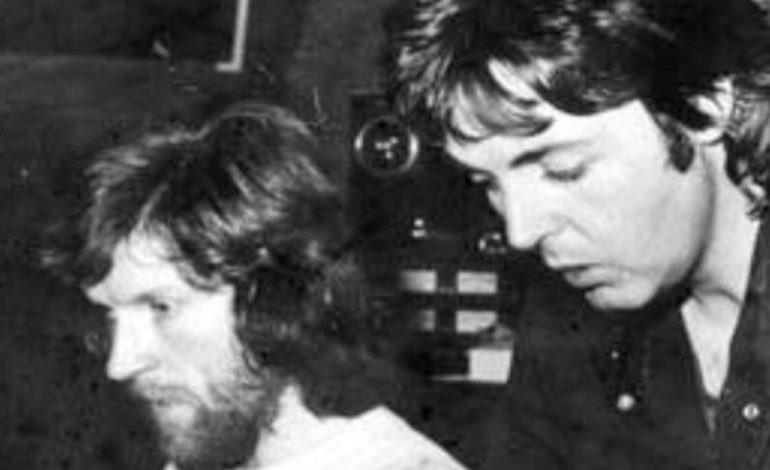
Fairport Convention are back on the road again following a forced hiatus for the past year-and-a-half.
This year’s Autumn Tour will present a mix of long-established Fairport favourites as well as some surprises from albums old and new including their latest album Shuffle & Go released in January last year.
Robert Johnson caught up with Chris Leslie (fiddle, mandolin and vocals) to discuss all things Folk and Fairport!
RJ: Are you particularly excited for this tour after an extended and enforced break as a band?
CL: I’m immensely looking forward to getting back on the road after such a long time. I put my mandolin away little thinking it would be over a year before I played with the band again! We did a couple of gigs in August getting our toe back in the water again. For instance, as the Cropredy Festival didn’t happen again for a second time, we got together in Cropredy village itself, and played at the back of Brasenose Arms, which has a long history with the band. We then broadcast the performance.
RJ: Is there anywhere in particular you’re excited to play?
CL: There’s such a nice variety of venues it’s difficult to pick one out. But if I had to single one out, I think Wells Cathedral will be interesting. Cathedrals are great despite being difficult. They have beautiful acoustics themselves but aren’t built for PA systems. However, we have a fantastic sound man Simon who is well versed in those kinds of venues and will be able to get the best out of all the amazing natural reverb.
RJ: So presumably this tour is for the Shuffle and Go album?
CL: We had just finished Shuffle and Go and done a winter tour to promote the album, and it was going really well, we loved the material on it. Some of it we had already been doing on the road and some was fresh from the studio, but it had settled very nicely, and it shows. During the lockdown we produced an off the desk live album and we we’re really on form, and it was nice to hear, as I’m not one to look back and listen to my albums too often. The album is yet to have its mileage on the road, so we are picking up where we left off. It’s still fresh when we rehearse it, which is a good sign.
RJ: You recorded the album at Woodworm studio, how did that influence the creative process, as the band has a considerable history regarding that place.
CL: Woodworm studio goes back such a long way, well before I was even in the band. When Dave Pegg and Dave Swarbrick moved to Cropredy in the early 70’s, my older brother met Dave Pegg in Banbury and as a consequence we became friends. We had some great times playing and hanging out around Pegg’s who had a recording space in a tiny attic room. When Pegg next moved, alongside his house was a Methodist Chapel, a pretty big building, and for the first time he had a dedicated space to work in. I would come over to work on various recording projects. So, for me this studio has an incredibly long association and means a lot. It means a lot to the band too, as when they reformed again, they did the first album with the new line-up there. We have a long relationship with that place.
It’s a lovely space to work in, it’s very funky and the village is great. You’re not trapped in the city, you’re out in the countryside, with a very friendly vibe. It has had two more owners since Dave got rid of it and it’s still a studio which is very rare. It’s got a fantastic long history and it’s great to be in there again.
RJ: You feature heavily as writer on this album, could you tell me about the song writing and song selection process?
CL: The band has had some incredible songwriters in its history Richard Thompson, Sandy Denny and Dave Swarbrick. The writing seems to come from who they are and their experiences, rather than any mainstream concern.
I’d written songs on and off before I was in the band, just when a song popped out really. When I joined the band back in 1996, Maartin Allcock was leaving, and we had co-written a song going on the album they were recording. What was great was when I joined the band, they were very encouraging, and wanted to get some writing back in the band again. Prior, they had turned the situation on its head and gone to lots of friends who were top notch writers like Ralph McTell, which was also very interesting. The material has always been really strong. They were very encouraging to me saying it would be nice to have an in-house contribution.
Consequently, over the years I have written more and more, and how lucky am I to write for a band like Fairport. It really sparked off my willingness and enthusiasm to write. I can feel a light go on when an idea comes to me. I find I work on it, not on the surface but rather something is ticking away inside without me consciously thinking about it. It’s interesting I’m often happiest with the songs that have taken the least time. I write a song, record a demo it and send it out to the band and see what the vibes back are like, and generally they seem to like it and take the songs on board.
RJ: So, when the band are involved, the song will evolve, sometimes in a way that can be a pleasant surprise. Is there a track on Shuffle and Go like that for you?
CL: When we start working together as a band, it really takes on another level with everyone else’s slant on it. For example, I didn’t even necessarily think Don’t Reveal My Name was a candidate for the repertoire. It’s a song that took my writing in a different direction, which I’m really pleased about. It has a subject matter I really love; I’ve been delving into the concept of magic, and it has a slightly mystical subject matter. It’s worked out really well for us, I love the Fairport arrangement on it. Simon’s guitar on it is fabulous, and Ric’s fiddle…everything. It has a mystical quality to it which is slightly unusual for Fairport Convention, but it still fits in. We’re stretching into another area.
RJ: The sequencing of the album is interesting, to have an unusual opener and then end with an instrumental, who’s idea was that?
CL: We have an immensely talented group of people who work with the band. John Gale was the producer, who I love working with and is very much responsible for the sound and quality of the record. I believe it was John’s idea to put Don’t Reveal My Name first as an opener, as people won’t be expecting it, and the mystical element sort of draws people in subtly. The instrumental we saw at the end as sort of like closing the box again, with the box going down by its own accord. John Gale was very integral in forming that running order, we all had our own input as well, but he came up with those two strong ideas.
RJ: What qualifies as folk music and what future does it have in an increasingly connected world?
CL: To me, folk music was initially something that couldn’t be credited, music with no traceable authors. Later came people like Woody Guthrie taking a stand against racism and bigotry. It was radical, he was taking his music to dangerous places and writing about what mattered to him. I still think that’s folk music, it’s music of the people. It’s music that gets people together and really stirs their hearts, that’s folk music. For me, The Beatles are folk music.
Outside the genre, people may view it as just acoustic music, but it’s much harder to define these days. What I love is every generation takes it and runs with it and they relate to it in their time. There is some incredibly great music recently like Bellowhead and Eliza McCarthy who are making folk accessible to their generation as well, long may that continue.
When I was in my teens, it was very easy to define folk music. Now, I’m in my 60s and it’s very difficult to define. Mainly as the world has changed, we are so much more informed especially young musicians, the standard blows me away.
RJ: Who would you say your main influences as a musician are?
CL: I was about 13 and my brother who was older came home with some LPs like Dave Swarbrick and Martin Cathy. The first time I heard Dave Swarbrick’s music I fell in love with it, with the sound, with the spirit of it and with his musicality. His accompaniment of songs was so brilliant he never got in the way of the singer, he could flit round the melody making it beautiful but never taking over and he had that innately. Another big early influence was Peter Knight from Steeleye Span, and Robin and Barry Dransfield and Aly Bain too. All very different players from each other, each with a different interpretation of what the fiddle could sound like. Then later the Irish players Kevin Burke and some of the old players like John Doherty.
Then a visionary friend a school, who was streets ahead turned me on to John Mclaughlin and The Mahavishnu Orchestra, which was a genre I loved… jazz rock! So, I came across Jerry Goodman, who was the only person other than Dave Swarbrick who plugged the violin in at that time. Jerry Goodman with Flock just showed the instrument could go anywhere. The Corries too, who built these Combolin instruments which was unusual in traditional Scottish music, so I got the idea from early on that there’s not only one way. All these influences have travelled with me, you find your own voice, how you interpret your emotions through music and alongside all that are these flavourings that colour your music.
RJ: So, there is room for spontaneity in your playing then?
CL: I will always go for performance over perfection. I’m perfectly happy with slight imperfections. I have a meter that has atmosphere, feel and emotion against perfection and there are lots of spaces I’m happy with on that meter. I’m open to imperfection if there is something bigger there.
Fairport Convention will play the The Plaza in Northwich as part of their Autumn tour on Wednesday 20th October.
You can buy tickets here
Robert Johnson


